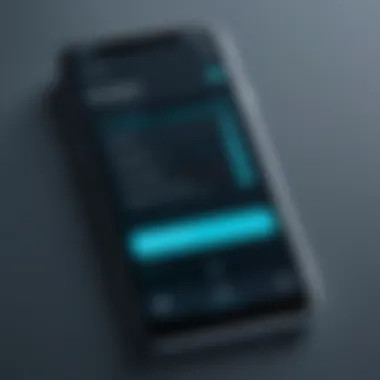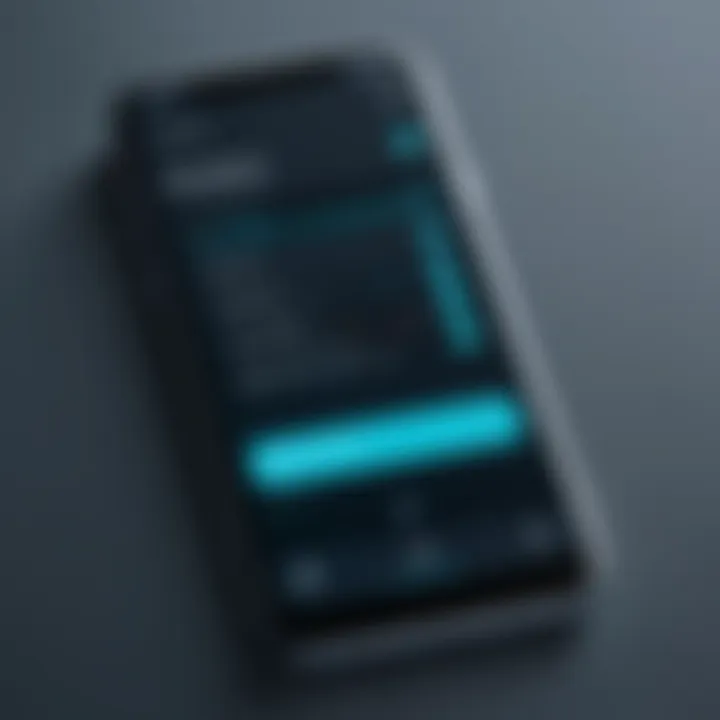Doctor Appointment Reminders: Enhancing Patient Care


Intro
In the landscape of modern healthcare, managing patient appointments emerges as a critical component for both patient care and operational efficiency. Doctor appointment reminders serve as a fundamental tool in achieving this goal. They bridge the gap between healthcare providers and patients, ensuring that appointments are kept. The significance of these reminders cannot be overstated. They enhance adherence to treatment plans, reduce no-show rates, and ultimately lead to better patient outcomes.
As we delve into the essential aspects of how to optimize appointment reminders, we will explore various types of reminders, their strategic implementation, and the impact of technological advancements in this area. The subsequent sections will equip you with valuable insights tailored for those involved in the healthcare sector, from administrative personnel to tech-savvy individuals keen on improving healthcare delivery.
Software Overview and Benefits
In the current healthcare environment, software solutions designed for managing doctor appointment reminders offer various key features and functionalities. Notably, these include automated messaging, multi-channel reminder options (like SMS, email, and phone calls), and customizable settings. Such software acts as a comprehensive appointment management system.
Benefits include:
- Increased Appointment Adherence: By sending automated reminders, the risk of missed appointments is reduced significantly.
- Enhanced Patient Engagement: Patients receive timely updates about their health scheduled commitments, improving overall engagement.
- Operational Efficiency: Healthcare providers can allocate resources better when they know in advance about schedule commitment.
- Data Tracking and Analytics: Insight into patient behavior through collected data helps improve future appointment strategies.
Priceing and Plans
The pricing structure for appointment reminder software can vary widely based on features and subscription plans. Many popular tools offer tiered pricing, featuring basic plans that serve small practices and advanced models catering to larger hospitals.
Comparatively, providers such as SimpleVisit and HealthQuest may have plans starting at $30 per month for basic functionalities, while advanced packages with extensive features could exceed $100 monthly. Evaluating the services you need against cost can help determine the best fit for your healthcare practice.
Performance and User Experience
Evaluating the performance of any appointment reminder software hinges on speed and reliability. Software solutions in this realm generally showcase robust systems designed for high reliability, ensuring reminders are sent in real-time without failures or delays.
Most commonly, reviews highlight a user-friendly interface, facilitating ease of navigation through the software. Many users report that onboarding is straightforward, thanks to well-structured training resources and customer support, aiding efficient user experience.
Integrations and Compatibility
Integration capabilities with other healthcare tools create further value for appointment reminder software. Many systems can effectively connect with electronic health records (EHR) systems like Epic or Cerner, promoting a seamless workflow.
Key considerations include:
- Compatibility with various operating systems, ensuring ease of use irrespective of device.
- Support for mobile platforms empowering patients to receive reminders on-the-go.
Support and Resources
Robust customer support is fundamental for any software used in healthcare management. Most appointment reminder solutions provide various options including live chat, phone support, and ticket-based assistance.
Furthermore, additional resources such as tutorials and guides help enhance every user's experience. Providers may offer webinars or training sessions to help teams optimize their use of the software and achieve better outcomes.
Statistical analysis reflects that healthcare practices employing appointment reminder systems witness an improvement in patient attendance rates by over 20%.
In summarizing this extensive outlook, navigating the terrain of doctor appointment reminders reveals crucial insights about enhancing the interactions between healthcare providers and patients. Efforts made in strategizing reminders quite substantially influence patient management and overall satisfaction.
Preamble to Doctor Appointment Reminders
Overview and Importance
In the realm of healthcare, the efficiency of appointment management plays a critical role. An essential aspect of this management is the implementation of doctor appointment reminders. They serve as a bridge between healthcare providers and patients, helping to ensure the continuity of care. The importance of these reminders cannot be overstated. Missing appointments can lead to delays in treatment, higher costs, and deteriorating health conditions.
On the organizational level, effective management of appointment reminders enhances operational efficiency. By reducing no-show rates, healthcare facilities can make better use of their available resources. Consequently, this leads to enhanced data management and can improve overall patient satisfaction.
Additionally, the integration of technology into reminding systems has opened up numerous opportunities. From automated SMS notifications to mobile applications, healthcare providers now have various tools at their disposal to keep patients informed.
The specific elements involved in a well-structured appointment reminder system include:
- Identification of patient preferences for communication.
- Timely distribution of reminders to mitigate last-minute cancellations.
- Privacy considerations to ensure relevant data is securely managed.
Thus, navigating the complexities of appointment reminders not only streamlines healthcare processes but also promotes a better patient experience.
Types of Appointment Reminders
Understanding the different kinds of appointment reminders is crucial for healthcare providers who wish to improve patient compliance and overall efficiency. Each type has unique characteristics and fits different patient needs and preferences. Fostering a well-rounded approach ensures reminders are more effective and help reduce no-show rates. Below is an in-depth review of the various methods employed.
Text Message Reminders
Text messages have become one of the most popular forms of communication. In healthcare, their effectiveness lies in their immediacy and high open rates. Most patients have their phones within reach almost all the time.


- They enable real-time communication and require minimum cognitive effort from patients.
- Sending quick SMS reminders about appointments can create a sense of obligation.
- Statistics usually show that over 90% of such messages are read within a few minutes.
Healthcare providers can personalize text messages with the patient's name, appointment date, and time. This personal touch can positively impact patient adherence to scheduled visits.
Email Notifications
Emails offer another layer of communication sophistication. This avenue allows for more detailed information within each message, accommodating various patient segments.
- Emails can include multiple functionalities like links to Einteractive forms or useful links to preparatory instructions (e.g., bringing ID, or medications).
- They also provide a convenient and professional tone, making them ideal for follow-ups or sending confirmations.
- Patients who become accustomed to digital communication may prefer inbox reminders, thus improving the likelihood of an engaged response.
However, the efficiency of email reminders can fluctuate based on individual patient behaviors, as some may overlook them. A solid subject line is essential to increase open rates and draw attention.
Telephone Calls
The traditional yet still relevant method of notifying patients is through telephone calls. Although often labor-intensive, it provides an opportunity for personal interaction and can be essential for specific patient demographics.
- Calls can help remind patients of special instructions that might need clarification.
- Senior citizens or individuals who aren't tech-savvy often prefer or respond better to personal interactions.
- They also allow for immediate feedback or questions from the patient, enhancing understanding and compliance.
Utilizing this method necessitates a structured approach to maximize time efficiency, as over-calling can burden office staff and hinder regular workflow.
Mobile Apps
With the rise of technology, mobile applications are emerging as significant tools for appointment management. Most patients already use various health-related apps, making integration into their routines apparent.
- They offer the capacity for reminders through notifications without requiring third-party services.
- Apps can manage appointments directly, allowing patients to reschedule easily based on personal capacity, thereby increasing adherence.
- They often provide added functionalities that give patients easy access to electronic medical records or prescription refills.
Benefits of Appointment Reminders
The implementation of appointment reminders serves a substantial role underlining patient care and overall administration effectiveness. A systematic approach to reminders not only mitigates risks associated with missed appointments but also enhances the patient experience, which is vital in today’s healthcare environment. Understanding the critical benefits of such reminders can equip healthcare professionals and administrative leaders with the tools to create an optimized patient management process.
Improved Patient Adherence
Appointment reminders facilitate improved patient adherence significantly. This occurs when patients receive timely notifications about their upcoming appointments. When patients are well-informed and reminded about appointments, they are more likely to attend, as they forget less frequently and feel engaged in their healthcare process. Research has shown that different reminder methods effectively lead to higher attendance rates in both preventative and ongoing medical treatment appointments. As adherence improves, so does the quality of care that patients receive, ultimately enhancing their health outcomes.
Reduced No-Show Rates
No-show rates are a pressing issue in most healthcare systems, often resulting in wasted resources and decreased productivity for healthcare providers. By integrating reminders, healthcare facilities can decrease these rates considerably. For instance, practices using SMS reminders have witnessed notable improvements in patient attendance. It is financially advantageous for facilities, often reducing costs linked with unfilled appointments. Following through with effective reminders directly correlates to an increase in the utilization of healthcare services, benefiting both patients and providers alike.
Enhanced Data Management
With the implementation of appointment reminders, healthcare providers can streamline data management processes. Systems can be set up to gather and analyze response data effectively showing how patients respond to different reminder types. Such insights can enrich understanding of patient behaviors and preferences, allowing for future refinement of communication strategies. Proper data management fosters improved health records and strengthens the overall operational structure within healthcare organizations, which is essential for continuous quality improvement initiatives.
Better Resource Allocation
Finally, better resource allocation is another fundamental benefit experienced through appointment reminders. By minimizing resource wastage due to no-shows and enhancing patient adherence, providers can better plan for staff scheduling, operational costs, and available services. As reminders allow facilities to access comprehensive records of appointment attendance, they can align staffing levels to real-time needs more effectively. This brings forth opportunities to not only cut costs but also improve the quality of care by maximizing each patient's interaction with provider resources.
Challenges in Implementing Appointment Reminders
Implementing appointment reminders can be a complex endeavor for healthcare providers. Despite the clear benefits, several challenges must be navigated to maximize the effectiveness of these systems. Addressing these obstacles is crucial as healthcare increasingly relies on technology for improved patient outcomes. A thorough understanding will enable health organizations to optimize their operations and enhance patient experiences.
Technology Dependence
One of the most significant challenges relates to reliance on technology. This dependence introduces potential pitfalls. Systems can malfunction or become outdated, leading to errors or missed reminders. The complexity of managing software can overwhelm staff who are not tech-savvy. Moreover, vulnerabilities in the software can expose sensitive patient data to breaches, heightening security concerns. Organizations must understand its need for consistent maintenance and regular updates, or else they may risk compromising both communication efficacy and patient safety.
Patient Engagement Issues
Patient engagement presents another hurdle in the implementation process. Not all patients respond positively to digital reminders. Different demographics have varying levels of comfort with technology. For example, older patients may prefer traditional communication methods and might find digital notifications cumbersome or confusing. Disparities in technological access and literacy can lead to unequal experiences among patients. Providers must develop strategies to engage patients effectively, catering reminders to fit personal habits and preferences to reduce any disengagement. Flexible options can deliver other forms of engagement, potentially driving higher compliance rates.
Privacy and Data Security Concerns
Privacy and data security issues represent significant concerns when automating any aspect of patient interaction. Handling medical information comes with strict regulations under laws such as HIPAA in the United States. Tighter scrutiny around data handling means that patients are increasingly wary of how their personal information is utilized or stored. Healthcare organizations must ensure that data protection measures align with regulatory requirements. Clear communication is essential for addressing patient anxiety and fostering trust. This involves being transparent about data use while training staff to recognize and mitigate privacy risks promptly.
"The successful use of appointment reminders hinges on the provider's ability to navigate these complex barriers effectively. Failure to address them can lead to diminished outcomes in appointment adherence and increased mistrust among patients."
For appointment reminders to realize their full potential, tackling these challenges head-on is essential. Through infrastructure support, strategies for demographic variation, and robust security protocols, healthcare providers can optimize their reminder systems, making them an invaluable part of patient care.
Best Practices for Effective Appointment Reminders


Effective management of appointment reminders requires adherence to specific best practices. These strategies significantly increase patient engagement and compliance, ultimately enhancing the overall efficiency of healthcare practices. Focusing on best practices allows healthcare organisations to optimise appointment reminders in a way that resonates with patients' preferences and behaviours.
Personalization Strategies
Personalization is crucial in appointment reminders. Patients respond better when reminders are tailored to their individual needs and preferences. Customizing messages based on patient histories, preferred communication methods, and past appointment behaviours can increase the likelihood of compliance.
Some strategies to personalise reminders include:
- Using Patients’ Names: Addressing patients directly fosters a sense of importance.
- Adjusting Messaging Tone: Depending on the patient’s age or familiarity, different tones can be employed to communicate effectively.
- Including Details Relevant to Patients: Incorporating elements like upcoming birthdays or specific health concerns can make the reminders feel more relevant.
By employing these personalisation strategies, healthcare providers can create an emotional touchpoint when sending reminders, encouraging might ensure better adherence.
Optimal Timing for Reminders
Timing holds great significance in ensuring appointment reminders are effective. Sending reminders too early may cause patients to forget the appointment, while sending them too close to the appointment time may not give patients ample time to adjust their schedules. Understanding optimal timing involves dissecting patient behaviour and preferences.
Recommendations for timing include:
- Sending a Reminder One Week Before: This gives patients sufficient lead time to prepare and adjust if needed.
- A Second Reminder One Day Before: Reinforces the initial message and serves as a last-minute prep.
By segmenting timing effectively, reminders can serve to significantly reduce worst-case scenarios like no-shows.
Multi-Channel Approaches
Adopting a multi-channel approach for appointment reminders enhances the healthcare experience significantly. Different patients will have different preferences regarding how they receive communication. Blending various methods extends a wider net of communication and improves patient outreach.
Key channels include:
- SMS Text Messages: Rapid delivery and high open rates.
- Emails: Provide more information and can include attachments like maps or insurance verification.
- Voice Calls: Useful for elderly patients who may struggle with technology and prefer verbal communication.
- Mobile Apps: Modern applications can provide push notifications alongside promotional offers or updates on healthcare tips.
Using a mix of these methods can increase compliance, as patients have various alternatives to choose what feels most comfortable for them.
By prioritising a combination of personlised outreach, thoughtful timing, and varied communication methods, healthcare organisations can significantly improve patient experiences and reduce no-show rates.
Role of Technology in Appointment Reminders
The integration of technology in appointment reminders signifies a transformation within the healthcare landscape. Embracing these tools can streamline the recall process and subsequently enhace patient experience. Healthcare facilities that utilize technological solutions find themselves not only improving efficiency but also adapting quickly to patient needs and operational demands. It is imperative to examine several components that frame this role, namely automated systems, EHR integration, and data analytics.
Automated Systems
Automated systems are crucial in managing appointment reminders. These mechanisms allow healthcare providers to send notices at scheduled intervals, minimizing manual workloads for staff and reducing the risk of human error.
- Efficiency Gains: By automating reminder processes, medical offices can reduce the time spent on appointment confirmations and cancellations. Staff can then allocate their time more effectively to patient-centric activities.
- Diverse Channels: Automated systems can incorporate multiple channels, including texts, emails, and calls, to reach patients according to their preferences.
- Customization: The programming options available in most automated systems foster tailored messages. Specifics like appointment time and personal greetings can personalize communications, increasing patient engagement.
Investing in good quality automated reminder systems leads to better management of patient appointments, ultimately reflecting in higher satisfaction levels.
Integration with Electronic Health Records (EHR)
Integrating reminder systems with Electronic Health Records enriches the overall utility of appointment management. Familiar data from the patient's profile informs reminder strategies.
- Centralized Information Access: Health professionals primarily benefit from having patient data within reach. When schedules sync with EHR, confirming appointments updates can occur simultaneously, enhancing accuracy and transparency.
- Targeted Messaging: Reminder content can reflect individual medical histories. Such details can enhance the relevance of reminders, including necessary preparations or referrals.
- Analytical Insights: A direct pipeline into EHRs necessitates analyzing trends. This understanding transitions into crafting more effective reminders encompassing aspects like frequency of missed appointments.
Integration solidifies the mutual support between appointment management and healthcare data. It unlocks opportunities for rescued costs while improving service delivery.
Data Analytics and Reporting
Data analytics provides actionable insights that amplify the efficiency of appointment reminder systems. Thorough analyses enable healthcare organizations to extract patterns and determine strategies that yield maximum adherence.
- Measure Effectiveness: Real-time reporting indicates which reminder methods work best. A healthcare provider can determine if text reminders outperform phone calls.
- Patient Behavior Study: Using analytics to understand patient behavior aids in refining engagement techniques. Identifying demographics grouped by appointment behaviors facilitates adjusted approaches targeted towards specific patient needs.
- Predictive Algorithms: Transform data exportation into prediction models revealing future appointment tendencies, operating a proactive framework for reducing no-shows.
The effective incorporation of data analytics not only reflects on appointment improvement flows but steadily nurtures overall clinical practice.
Future Trends in Appointment Reminders
The future of doctor appointment reminders stands to redefine how healthcare providers manage patient interactions and uphold their commitment to care. Advancements in technology serve as foundational elements in enhancing the efficacy of reminders. With these innovations, patients achieve not only higher adherence to appointments but also a more tailored experience that aligns with their individual needs. Understanding these future trends provides valuable insights for both healthcare personnel and administrative groups aiming to streamline operations and promote patient engagement.
AI and Machine Learning Applications


Artificial Intelligence (AI) and machine learning will play significant roles in the evolution of doctor appointment reminders. These advanced technologies have the potential to analyze vast amounts of data related to patient demographics, behavior patterns, and preferences.
By leveraging AI, healthcare providers can craft personalized reminders that not only account for the patient's medical history but also their preferred timelines and communication methods. Here are some key advantages:
- Improved Accuracy: AI can predict patient adherence rates based on prior appointments. This predictive capability aids clinics in sending timely reminders to those identified as high-risk for no-shows.
- Enhanced Personalization: Machine learning algorithms can analyze how various patients respond to different types of messages, allowing for tailored communications that may resonate more effectively with each patient.
- Support for Workflow: AI systems can integrate reminders within existing EHR platforms, automatically triggering calls or texts as new appointments are scheduled or nearing cancellation dates.
The key consideration is ensuring that these systems are correctly integrated for data to flow securely and effectively between diverse health data sources without a breach of patient confidentiality.
Telemedicine Integration
With the rise of telemedicine, appointment reminders must adapt to facilitate remote visits effectively. Telemedicine offers an alternative to in-person consultations and serves a vital function in patient care, particularly in rural or underserved areas. Suitable reminders are crucial in ensuring patients are aware of when and how to engage in virtual appointments.
Relevant practices in integrating telemedicine with appointment reminders include:
- Visual Reminders: Companies can develop notifications specifying the app or platform to utilize, guiding the patient through the setup process seamlessly.
- Real-Time Streaming Notification: Reminders can tap into real-time data links, providing information regarding service disruptions or rescheduling options directly to those patients impacted.
- Incorporating URLs: Notifications should not only include timing information but also direct links to the telemedicine site or necessary applications. This effort seeks to lessen the cognitive load on patients visiting the e-practice for the first time.
Emphasizing telemedicine dynamics enhances convenience for patients and aligns perfectly with current healthcare trends associated with increased digital access to care.
Blockchain for Enhanced Security
Implementing blockchain technology in appointment reminders signifies a promising shift towards reinforced security measures. Enhanced privacy mechanisms embedded into blockchain create a more trustworthy system whereby patient data accessed during reminders is safeguarded effectively. Blockchain provides a codified trail of activity everyone involved can audit while minimizing risks of data exposure without consent.
Specific benefits of blockchain technology include:
- Data Integrity: Information cannot be altered without consensus across the network, which guarantees patients that their data stays intact and secure every time a reminder is generated.
- Enhanced Authentication: Each participant, including staff and patients, has a unique identification method, ensuring a layer of protection against unauthorized access.
- Decentralized Control: By depending on a decentralized system, healthcare providers and patients can exchange information without falling prey to centralized database attacks, which have plagued many healthcare facilities.
In summary, looking towards blockchain technology not just elevates security but could significantly reshape patient interactions, considering trustworthy communication stands essential in the realm of healthcare.
Case Studies: Successful Implementation of Appointment Reminders
Case studies are essential for illustrating the real-world impact of appointments reminders in various healthcare settings. Understanding these practical implementations provides key insights into how these systems improve patient compliance, reduce no-show rates, and streamline overall operations. In examining successful case studies, healthcare professionals can see tangible results and decide effective strategies to adopt in their own practices.
Healthcare Providers with High Compliance Rates
Successful healthcare providers often implement appointment reminders in various effective and innovative ways. For example:
- ABC Clinic reported a 40% decrease in no-show appointments after integrating an interactive text message reminder system. Patients receive a reminder 48 hours before their appointments, allowing for easy confirmations or rescheduling directly through SMS.
- XYZ Hospital utilized email reminders alongside texts resulting in their appointment adherence remarkedly increasing from 70% to 85% within three months. They customized messages to include relevant health tips based on the type of appointment.
This demonstrates that being proactive with personalized messages significantly promotes patient accountability, leading to higher compliance rates.
Comparative Analysis of Reminder Methods
Different reminder methods cater to diverse patient populations and usability needs. A comparison of various methods and their efficacy can enable better decision-making.
- Text Message Reminders:
- Email Notifications:
- Telephone Calls:
- Mobile Apps:
- Excellent for its immediacy and direct reach.
- High engagement rates due to mobile devices being commonly used.
- Appropriate for detailed messages.
- Works effectively for patients engaged in their health management.
- Often connected to patient portals, providing additional resources and tools.
- Well-suited for elderly patients who may be less tech-savvy.
- Allows the opportunity to answer questions in real-time.
- Provides a user-friendly platform for managing appointments with real-time updates.
- Encourages a range of interactions beyond just reminders, such as medication reminders or health updates.
Each of these methods has strengths and weaknesses. Adoption should consider factors such as patient demographics, technological access, and the specific nuances of appointments being reminded about. A multi-channel approach might provide the best results in any given practice, ensuring that patients receive their reminders in a way that is most effective for them.
“Implementing reminder systems based on a patient’s familiarity with technology plays a vital role in enhancing healthcare delivery.”
By exploring these case studies and the comparative effectiveness of various approaches, healthcare administrators can design effective appointment management systems that will improve patient interaction and satisfaction levels significantly. Through continual assessment of patient responses and outcomes, practices can further refine their reminder methods for optimal efficiency.
Culmination
Doctor appointment reminders play a vital role in modern healthcare. Their significance extends beyond merely notifying patients about upcoming visits. They enhance patient adherence, reduce no-show rates, and can contribute to better management of healthcare resources. Effectively implementing appointment reminders is crucial not only for improving patient engagement but also for optimizing operational efficiency within healthcare facilities.
Recap of Key Points
- Types of Reminders: Text messages, emails, calls, and mobile app notifications help cater to varied patient preferences.
- Benefits: These reminders facilitate decreased no-show rates, improving resource allocation and enhancing data management.
- Challenges: The reliance on technology could lead to engagement issues and data privacy concerns.
- Best Practices: Employing personalized strategies and mastering timing ensures that reminders are both helpful and timely.
- Role of Technology: Automated systems and data analytics are crucial for effective appointment management.
“Reminder systems bridge the gap between healthcare providers and patients, fostering partnerships that promote health.”
- Future Trends: Advances like AI, telemedicine, and blockchain are set to redefine how reminders function in patient care environments.
Final Thoughts on Appointment Reminders
Implementing effective doctor appointment reminders reflects a commitment to patient care. As healthcare evolves, adapting to technological advancements becomes essential. Embracing these systems not only meets patient needs but also stays ahead in the increasingly complex landscape of healthcare. With a focus on privacy, technology integration, and strategic applications, professionals can significantly improve appointment management practices and enhance overall patient satisfaction.







